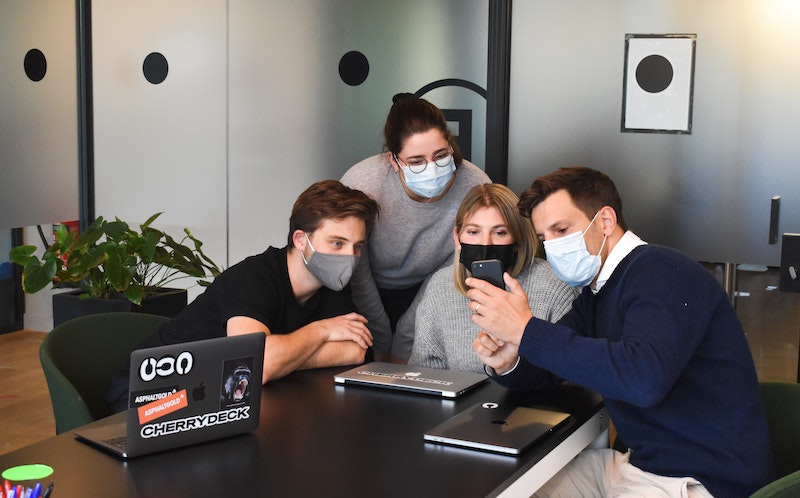On July 28, 2021, Atlanta Mayor Bottoms signed into effect an Executive Order requiring persons to wear a facial covering or mask over their mouth and nose when indoors in certain places located within the boundaries of the City of Atlanta. This Atlanta Mask Mandate 2021 Executive Order replaces the now expired mask mandate the Mayor issued on July 8, 2020.
This Blog discusses the effects of the mask mandate on community associations in the City of Atlanta amid the now rising number of Georgia COVID-19 cases and discusses what condominium and homeowners’ association boards should consider for the operation and management of common areas and common property.
Unless one of the 10 exceptions applies, the Mayor’s Executive Order requires all persons in an entity or public place to “wear a facial covering or mask over the mouth and nose at all times when indoors. ”An entity is defined as “any private business, establishment, corporation, non-profit corporation, or organization”. A “public place” means any place other than a personal vehicle, upon residential property or in an entity. Facial coverings or masks are not required when a person is in a personal vehicle, upon residential property or when a person is alone in enclosed spaces or only with members of the same household.
While the Atlanta mask mandate 2021 exempts persons on residential property, community associations are non-profit corporations. Accordingly, the intent of the Order is to require individuals to wear a mask when indoors on the community’s property when they can be in the presence of another person. We refer to the intent of the Order to require a mask when indoors when a person can be in the presence of another person because the Order does not define what is considered “residential property.” Is a resident “upon residential property” within common area or common property of community associations, including lobbies, elevator banks, vestibules, hallways, and indoor amenities? Or, is residential property only within a unit or home?
In the context of exempting individuals when in personal vehicles, the individual knows the other persons in the vehicle and there is no possibility of being in the presence of any other persons. Also, since members of the public, meaning non-residents, generally can enter community association property as guests, contractors, service providers, etc., the common property is used as a public place to get to and from the residences. Accordingly, we believe common area or common property of a community association is not considered “residential property” within the Mayor’s mask exception.
What Mask Mandate Actions Should Boards of Community Associations Take?
No. A community association’s board of directors is not obligated to enforce the mandate of the Mayor’s Executive Order against residents or their guests. The Order specifically states that violations shall not be enforced against “any entity and shall not be taken against any owner, director, officer, or agent of an entity solely because of the failure of their customers to comply with this Order.” However, the Order does state that every reasonable effort shall be made to bring an individual into voluntary compliance with the terms of this Order prior to issuance of any notice of violation, including providing complimentary masks, explaining the importance of wearing facial coverings during this pandemic, and issuing verbal and written warnings.
Enforcement is to be by any police officer, code enforcement officer, or other authorized law enforcement official against any person who fails to comply. A person who fails to comply will be first given a warning and an opportunity to either put on a facial covering or mask, leave the area subject to the mandate, or demonstrate that one of the 10 exceptions applies. If a person fails to comply with the mandate after being given a warning, then the person may be subject to a civil penalty of not more than $25 on the first offense and not more than $50 on the second or any subsequent offenses.
What Action Should Boards of Community Associations Take?
The boards of community associations in Atlanta city limits can review the impact the Executive Order has on the indoor common area or common property of the community. If a board is discussing whether it can or should implement its own mask mandates for the community, then the board should consult with the association’s community association attorney. Because each association’s governing documents are unique, the documents will determine the requirements and authority for enforcing mask rules if adopted. Boards may also evaluate the association’s ability and resources to enforce any such rule.
The Georgia COVID-19 Pandemic Business Safety Act May Still Shield the Association from Potential Liability
We have previously discussed on this Blog the importance for community associations to comply with the Georgia COVID-19 Pandemic Business Safety Act(extended until July 14, 2022). The Act is a state law that limits claims for COVID-19 liability except in cases of gross negligence, willful and wanton misconduct, reckless infliction of harm, or intentional infliction of harm. The Act is not affected by Mayor Bottoms’sExecutive Order.
The Act’s requirements for posting signs and taking some action to prevent the spread of COVID-19 remain in effect. For a community association to receive the protections afforded under the Act, associations must continue to comply with the Act’s requirements, including keeping the required signage at entries and exits to common property such as lobbies, pools, clubhouses, and fitness centers.
Contact the HOA Attorneys at NowackHoward to Help Advise Your Board of Directors
There is no specified expiration date for Mayor Bottoms’s Executive Order. As always on our blog, this post is general information, and it is not legal advice. Your board should contact your community association attorney if it has any questions regarding the Mayor’s Executive Order or if your board is considering adopting a mask requirement for common areas or common property within your community.
Our HOA attorneys represent condominium associations and HOAs throughout Georgia. To learn more about our practice, HOA attorneys or how we can help guide your community, contact us at (770)-863-8900 or email usatinfo@nowackhoward.com.
©2021 NowackHoward, LLC. Unless otherwise stated, all contents of this website are the sole property of NowackHoward, LLC and may not be reproduced in whole or in part without express written consent.


